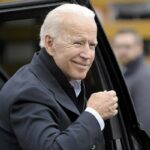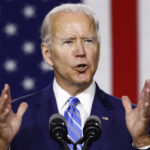Congratulations to Mr. President Joseph R. Biden Jr. and Madam Vice President, Sen. Kamala Harris, on their well-earned victory in about the toughest presidential race in the United States history.
Good policy begins with the ability to recognize reality. And the reality of USA-Nigeria relations, like all diplomatic relations, is driven by mutual needs and interests. Beyond the global issue of resolving the Coronavirus Pandemic, the United States problems are basically three in nature – terrorism and insecurity especially in the Islamic World; threat to its corporate economic and technological preeminence and global dominance; and apparent failure to fashion out how best to handle and resolve these challenges.
And for Nigeria, her problems are also mainly three in nature – insecurity, corruption and severe economic depression. If your administration keys in on these issues and sees them as mutually reinforcing and their resolution as commonly beneficial, and resolves to work towards it, then USA-Nigeria relations would succeed in the best interests of both countries.
Making a comprehensive analysis of these issues will show that Nigeria needs the United States in solving her problems in as much as the United States needs Nigeria’s problems resolved as a critical element in the resolution of her own problems. As you very well know, Mr. President, with the fall of communism on the global scene, the Western World under the leadership of the United States came into direct conflict with the Islamic World in what seems to be a clash of civilizations. The seemingly irreconcilable ideological positions of the two former allies have since put the world’s security on the edge. Also, under the effect of globalization, the United States strategic economic and technological preeminence as a dominant superpower came under severe threat globally. The war for wealth, a nasty fight for a share of prosperity, and the related struggle over political and cultural dominance of the world have become the major challenges the US is facing across the globe today. The era of America’s supremacy, in which it overshadowed the rest of the world with its economic and technological might, is fast coming to an end. A new topography of the global power equation is taking shape as globalization is shifting world economic emphasis from the United States.
America needs to look beyond Asia and Europe for its economic expansion and preeminence. With the emerging crisis of confidence in relations between America and the Muslim World, especially in the aftermath of 9/11 terror attack, and the accompanying tension between them following the declared war on terrorism, the US has only one large region to look up to – Africa.
In Nigeria, there are probably more commonalities among ethnoreligious groups than differences. With the right economic and social environments, Nigeria can reclaim this African heritage without being overwhelmed by the forces of global religious extremism. The current Boko Haram terrorism, herdsmen banditry and ethnic militias in Nigeria are in fact exceptions rather than the norm. They are the result of constitutional freedom, poverty and economic hardship, lack of any form of dialogue with the affected communities, and poor and misplaced policy options by successive governments in the country that sparked off the conflicts.
While the ‘democratic constitution’ of the county brought in liberty, rights, and freedom to individuals and groups in the country, the promised and expected ‘high standard of living’ woefully failed to materialize. On the contrary, there resulted in a large scale and widespread poverty and hardship across the land, chiefly brought about by poor or failed public policies, high level of corruption and dishonesty by elected public officers, among many other vices in public service.
Furthermore, in so short a time, there emerged in the country a glaring disparity in the earnings and living standards amongst the citizens never seen before in the history of economic and social mobility of a people anywhere in the world; such that today in Nigeria less than 5% of Nigerians own and control over 95% of the national wealth, while more than 95% of the citizens struggle daily to survive on less than 5 per cent of the country’s resources.
For all the facts have shown that terrorism, banditry, and militancy are basically the result of failed expectations of ‘dividends of democracy’ under the civil rule. Contrasting the personal and collective freedom and liberty of citizens ushered in through constitutional democracy with the failed promises and expectations of an improved standard of living of citizens, one then sees clearly the seeds of crises being sown in the society. Add the polarization and great disparity of wealth amongst citizens, the overt and insensitive corruption by public servants, the increasing widespread of poverty and deprivation within the vast majority of the people, the extreme forms of election frauds by incumbent leaders, the compromised judiciary, etc., relations between the government and the governed invariably came under severe stress. Because the local civic cultures could not withstand the stresses and strains of these economic and political pressures, it naturally bred disappointment, despair and instability. It then takes very little for civil resistance to go virulent. This is the apt explanation of the various insurgencies, including the BH insurgency and banditry, ravaging the country today. Hence it makes no sense to debate whether these insurgencies are political, socio-economic or religious. The answer is they are all of the above.
In formulating your policy relations with Nigeria, it is critical to take these dynamics of the Nigerian situation into account. And for President Muhammadu Buhari to enlist the support of your administration to help resolve these problems, he must understand their fundamental underpinnings; in both economic and political terms. At the economic level, Nigeria would need the support of the United States to come forcefully in terms of funding, investments, transfer of technology, conquering hunger, and other initiatives; at the same time decentralizing economic opportunities and national resources in such a way as to bridge the wide gap between the rich and the poor amongst Nigerians. On the political side, Nigeria would need the United States’ support in strengthening her institutions, tackling corruption, building infrastructure, freely opening the political space, entrenching constitutionalism and rule of law, bolstering credible electoral processes and in creating level playing fields in politics to avoid causing system break down.
In return, on her part, Nigeria, being the most dominant in the African Continent, with the largest human and material resources, and the largest number of Black Muslims in the world, should play a central role in the fight against terrorism, in global stability and the advancement of the US economic and strategic interests. Already a strong international player in peacekeeping operations, Oil and Liquefied Natural Gas deposits, Oil pricing within OPEC, leadership role in the OIC, AU, ECOWAS, etc. Nigeria is well-positioned to partner with the US in fighting terrorism and stabilizing the global environment. As a country with the largest non-Arab Muslim population in Africa, Nigeria can play a key role in evolving constructive specific relations regarding America with non-Arab Muslim countries that can serve as a counter-balance to the broad international relations between the West and the Islamic World.

 Join Daily Trust WhatsApp Community For Quick Access To News and Happenings Around You.
Join Daily Trust WhatsApp Community For Quick Access To News and Happenings Around You.


